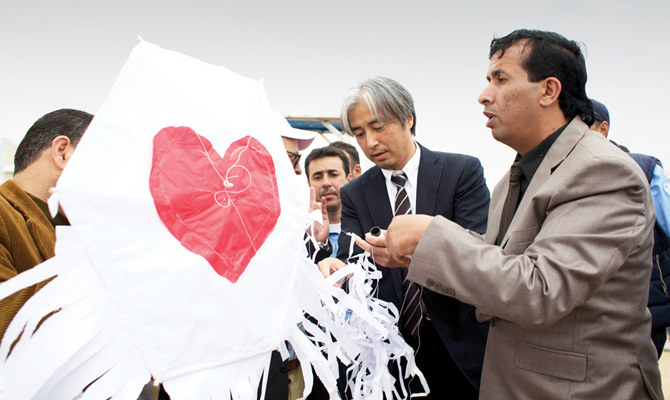DUBAI: Japan could potentially be a mediator in the Israeli-Palestinian conflict. At least that is what the majority of Arabs in a YouGov survey hope for.
The study looked at Arabs’ perception of Japan, polling the views of 3,033 people from the GCC, the Levant and North Africa.
When asked to name the most neutral mediator for a possible peace deal between Israelis and Palestinians, Japan was ranked first by 56 percent of Arab respondents, followed by the EU at 15 percent and Russia at 13 percent.
This is an overwhelming majority, considering the US only received 11 percent approval and the UK 5 percent.
“The findings of the survey are not surprising because of the Japanese approach to the region and the nature of Japanese society that puts Tokyo in that specific light,” said Theodore Karasik, senior adviser at Gulf State Analytics in Washington, DC.
“Japan’s approach to the Middle East earns respect from many different stakeholders. It is a mix between the politics of accommodation combined with the evolution of Japanese business practices, especially by the Japan External Trade Organization (JETRO), the Ministry of Economy, Trade and Industry (METI) and other agencies.”
Support for mediation by Japan is highest in the older age group: 66 percent of those aged 40 and above chose Japan, compared to 45 percent of 16 to 24-year-olds.
The older age group were less likely to support the US as a mediator, with only 6 percent.
Opinion
This section contains relevant reference points, placed in (Opinion field)
In terms of nationalities, Jordanians had the lowest support of the US as a mediator, with only 4 percent considering them a neutral mediator, and 73 percent choosing Japan.
Palestinians also ranked Japan high on their list – at 50 percent – followed by the EU, which 27 percent of Palestinians said would be a good mediator.
The figure is significantly higher than other Arab countries, of which on average only 15 percent selected the EU as their top choice.
“The findings are not a bit surprising,” said Albadr Alshateri, politics professor at the National Defense College in Abu Dhabi.
“Japan has always maintained an equidistance from the belligerents. It recognized Palestinian rights and the Palestine Liberation Organization (PLO) early on, while maintaining friendly ties with the Arab world.”
He said Japan extended a lot of aid to Palestinians through many programs such as Assistance to the Palestinian refugees, to the Gaza Strip, socially vulnerable people and for improving financial conditions.
“Japan has no stake in the Arab-Israeli conflict one way or the other, thus appearing neutral in such conflict,” he told Arab News. “Secondly, Japan’s geographical distance from the Middle East allows for a more detached approach to the conflict.”
Palestine is not the only Arab state that has been aided by Japan. In May 2016, the Japanese government announced it would accept a maximum of 150 Syrians as students over five years with the aim of offering educational opportunities to Syrian youth, who will contribute to Syria’s future reconstruction when it takes place.
For this purpose the Japan International Cooperation Agency (JICA) established the program “Japanese Initiative for the future of Syrian Refugees” in cooperation with the United Nations High Commissioner for Refugees (UNHCR). Japan has also contributed $7 million this year for emergency assistance in Syria.
In the survey 60 percent of Syrians picked Japan as a potential mediator, over Russia at 21 percent. Nationals from the Levant strongly supported Japan in a mediator role, at 63 percent, whereas only 6 percent selected the US.
“There is no pro-Israeli constituency within Japan; and no Israelis are of Japanese descent,” Alshateri noted.
“Whereas Russia is exactly the opposite: a large number of Israelis are of Russian descent of recent and older immigration. Likewise, with Europeans who have greater skin in the game.”
Looking to the future, Karasik said Japan could become a mediator on the Israeli-Palestinian issue because of Tokyo’s balanced approach. In addition, because of Japanese interests in the region in infrastructure and investment, he believes Tokyo may be a good candidate.
“It also helps, of course, that Japan has excellent relations with all “area” states, which puts it in an interesting position,” Dr. Karasik said.
“Investment by Gulf States in Japan and Tokyo’s investment in the region make for a good balance in approaching the Israeli-Palestinian issue from the East without a Russia or a China fully involved, although both Moscow and Beijing will have much to say in this scenario.”
Karasik believes Japan’s entry into this arena is likely to be halted by Moscow since the Kremlin wishes to be the driver of any settlement.
“But if Russia sees an advantage in Japan leading such talks, then there may be a geopolitical bonus in another arena, probably in Northeast Asia,” he said.
In Alshateri’s opinion, Japan could play an auxiliary role in the mediation of the conflict, given its economic and financial muscle and diplomatic weight.
However, he believes it lacks leverage on the principle protagonist — Israel — to persuade it to make the necessary concessions to obtain peace.
“Japan understands that the conflict is quite radioactive, and perhaps will avoid being entangled in a process that it will reap no benefits from,” he said.
“The sensitivity of the conflict for the US is all-obvious for anyone to attempt at resolution. Last but not least, Japan has enormous interest in oil, and oil producers are distancing themselves from the conflict, to put it mildly.”
Given all of these factors, he concluded that one cannot be very sanguine about Japan or anybody else’s mediation in this “rather intractable” conflict.
“Japan’s role will be welcomed by Arabs and Palestinians for all these reasons,” he said. “Whether it will bear fruits is something else.”

























